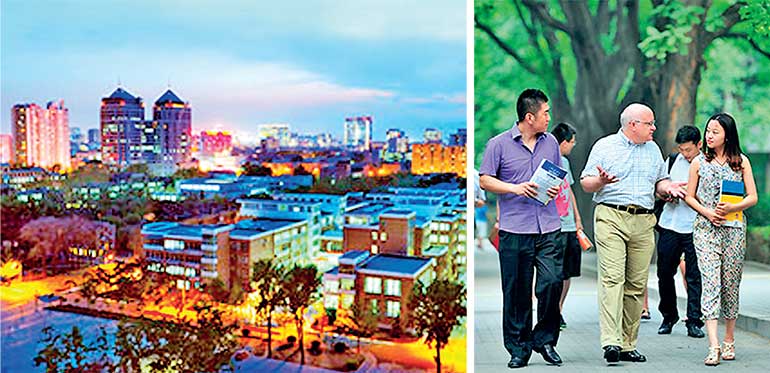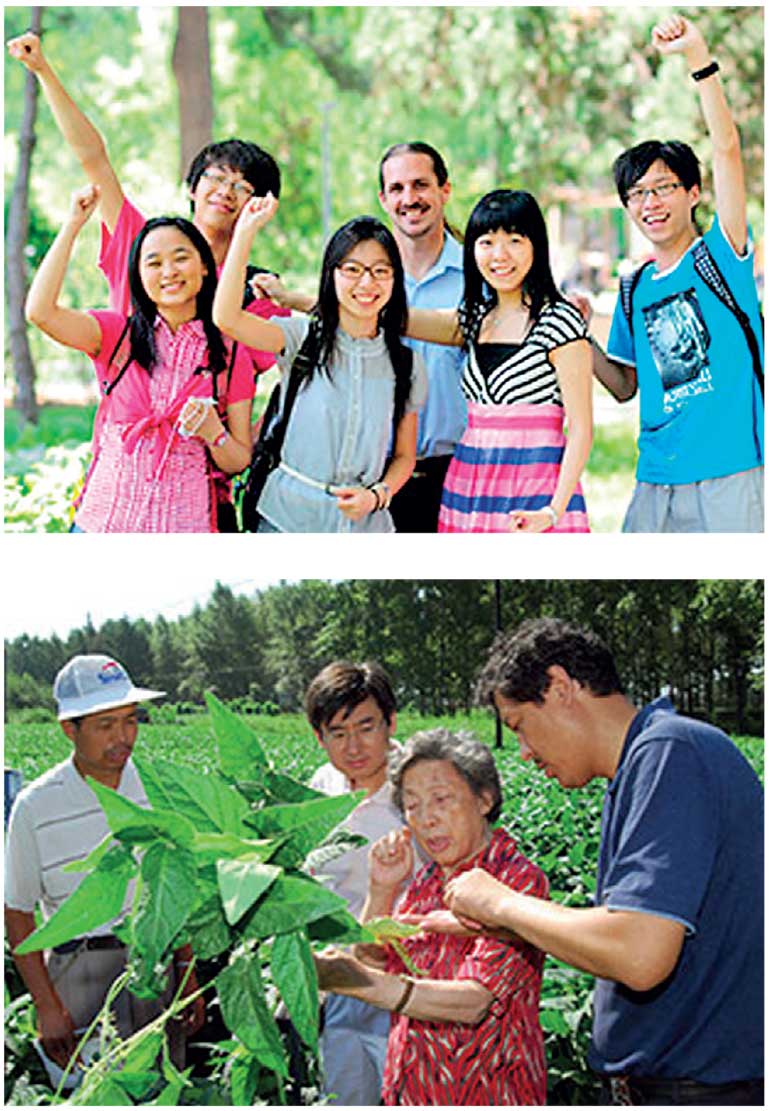Tuesday Feb 24, 2026
Tuesday Feb 24, 2026
Monday, 12 December 2022 00:50 - - {{hitsCtrl.values.hits}}


International education requires the development and maintenance of partnerships with a variety of academic institutions, Government agencies, for-profit and not-for-profit organisations for student and faculty mobility and international collaboration in other academic areas such as research. Thus, universities sign Memorandum of Understandings (MoU) with universities and institutions both within the country and around the world.
MoU is used to show the intent of collaboration without yet committing to specific activities. It does not technically represent a binding agreement but often signals the intention of working towards one. It should be considered a formalisation of a relationship and often provides an opportunity to agree on mutual goals and intent.
Through this strategic collaboration, both parties will support each other in enhancing the quality of education and research. Each active MoU serves a specific purpose such as visiting scholar exchanges, student exchanges, resource sharing, collaborative research, faculty exchange, short-term programs, etc., depending on the needs of the entity initiating the agreement.
In order to enhance the educational uplift of Sri Lankan education, Sri Lankan State and private universities also sign various MoU’s with international and local universities and institutions to implement several special schemes and to increase the quality of education.
The University of Jaffna (UoJ) is no exception to this and has signed multiple MoU’s to uplift Sri Lankan education, especially in the North and East.
Below given are some of the MoU’s signed by UoJ.
• MoU with the Western Norway University of Applied Sciences on educational and research cooperation at Masters and PhD level
• MoU with Centre for Media and Information Literacy (CMIL) to promote Media and Information Literacy (MIL)
• MoU with the International Foundation for Electoral Systems (IFES) to develop and offer a certificate course titled ‘Democracy: From Theory to Practice’ to 30 selected students of the Department of Law
• MoU with Annamalai University, India for the establishment of academic partnership on Education, Human Resource Development and Institutional Capacity Building
Likewise, Sri Lankan universities have signed multiple MoU’s with Chinese universities which is not a new phenomenon. No doubt that Sri Lankan can benefit from China’s advanced education system. China has established the world’s largest higher education system for more than a decade and a number of Chinese universities, and a large number of disciplines have reached a very advanced level in the world.
Also, innovation and entrepreneurship education in China lead the world. For example, China’s colleges and universities provide key technology for high-speed railway, nuclear power, biological breeding, vaccine development, national defence, and other key areas, and actively participate in the development of supercomputers, the BeiDou satellite navigation system, and the Shenzhou spacecraft series.
Below are some of the MoU’s Sri Lankan universities signed to uplift Sri Lanka’s education.
• University of Colombo and Tsinghua University, Beijing, entered into a MoU to enhance resource sharing
• University of Colombo and Southern University of Science and Technology (SUSTech), China signed the MoU to open up more opportunities for both students and staff of the two universities
• The University of Sri Jayewardenepura signed a MoU with the Beijing Institute of Technology of China, with the purpose of promoting student exchange programs between the two institutes
• The University of Sri Jayewardenepura signed MoU with Zhejiang Shuren University (ZSU) of China to introduce a Chinese Language degree to the University of Sri Jayewardenepura
However recently, the University of Jaffna Students’ Union said they are opposed to a move by the Government to sign a MoU between University of Jaffna (UoJ) and China Agricultural University (CAU), saying that the MoU has a hidden agenda. It is very disappointing to see how disinformation and fake news is spread to distract or discredit.
However, University of Jaffna (UoJ) Vice Chancellor Prof. S. Srisatkunarajah spoke highly about the historic links between Tamil and Chinese people, and the academic exchanges and cooperation between the universities in both countries when he met the Ambassador of China to Sri Lanka Qi Zhenhong recently in Colombo.
Further, Prof. Srisatkunarajah stated that so far, seven academic staff in the University of Jaffna got their doctorates from Chinese universities and thanked China for the grant to the University of Jaffna and the 1.6 million doses of vaccines donation from which himself is a beneficiary.
During the meeting, the Chinese Ambassador emphasised that China-Sri Lanka friendship is also deeply rooted in the northern districts and has benefited the northern people as well. He handed over the Chinese Ambassador’s Scholarship of Rs. 4.3 million to 82 students from the university. The scholarship, with Rs. 5000 per month per person, will help to support these students from underprivileged families for an academic year.
The University of Jaffna (UoJ) is a public university in the city of Jaffna in Sri Lanka. Established in 1974 as the sixth campus of the University of Sri Lanka, it became an independent and autonomous University bearing the name the University of Jaffna in 1979. Since that, the University has grown enormously and is today the home of eight faculties with 57 academic departments, several service/academic/support units and centres. The student population of the university is about 7000.
The China Agricultural University is one of the top-ranked key national universities in China. China Agricultural University is at the forefront of Chinese modern and advanced agricultural education, originating as the Imperial Agricultural University in 1905.
CAU owns a total campus area of 157 hectares, of which constructed area is over 1.22 million square meters. CAU has three campuses, including the East Campus, West Campus, and Jianshe Campus and 14 colleges, including International College Beijing.
Students have free choices to enrol in more than 60 Undergraduate Specialties, around 140 Masters Programs and more than 80 Doctoral Programs if qualified. The trend of student population continues to rise with more than 70,000 students in total currently enrolled.
CAU has a strong and well-structured teaching staff. There are 2041 full-time teachers, including 770 professors (including research fellows) and 996 associate professors (including associate research fellows). There are 1782 full-time postgraduate supervisors, including 1203 doctoral supervisors and 579 master supervisors.
In recent years, CAU has significantly accelerated the pace of opening up education to the outside world. Developing itself into an internationalised institution, CAU considers international exchange and cooperation to be a significant component of its mission. The school has established friendly cooperative relations with more than 240 universities, research institutions, and international organisations in more than 50 countries and regions in Asia, Africa, Latin America, Europe, and America.
In accelerating the construction of world-class universities, the school has established the “World’s Top Agriculture-related Universities Alliance (A5)” with Cornell University in the United States, Wageningen University in the Netherlands, University of California, Davis, and the University of Sao Paulo in Brazil.
Under the Belt and Road initiative (BRI), CAU also organised 40 domestic and 35 foreign agricultural and forestry colleges to jointly establish the “Belt and Road” Agricultural Education Technology Innovation Alliance and built 11 “Belt and Road” agricultural cooperation centres, two One China-Africa Joint Centre for Modern Agricultural Technology Exchange Demonstration and Training, and six China-Africa Agricultural Development and Poverty Alleviation Demonstration Villages.
CAU maintains long-term cooperative relations with important organisations such as the Food and Agriculture Organisation of the United Nations, the World Food Program, the United Nations Development Program, the United Nations Office for South-South Cooperation, the World Bank, the Asian Development Bank, and the African Green Revolution Alliance, and jointly conducts policy dialogues, think-tank research and international cooperation.
The university has long-term cooperated with the University of Colorado, Denver and Oklahoma State University to carry out Sino-foreign cooperative education projects and has carried out various joint training programs for undergraduates, masters, and doctors with a number of friendly institutions, academic competitions, summer camps, etc.
Inter-university exchange projects, include the University of Edinburgh in the UK, the University of Hohenheim in Germany, the French National Institute of Agriculture, Food and the Environment, the University of Alberta in Canada, Tokyo University of Agriculture, Sukuin University in Tanzania, etc.
On a separate note, UoJ sources have told a local newspaper that this scholarship has drawn Indian concerns. Earlier, India raised concerns over sea cucumber farming and Hybrid renewable energy systems in the North and East of Sri Lanka.
Sri Lanka needs new technologies, business know-how, and capital, as such, India should try to fill the investment and knowledge gap deemed important to Sri Lanka by investing whatever amounts they can, rather than trying to counter China and the Belt and Road Initiative. Sri Lanka needs investments, not broken promises, from India.
Whether India likes it or not, the Belt and Road Initiative (BRI) has been driving infrastructure development in Sri Lanka, with many roads, railways, ports, bridges, and irrigation projects either completed or under construction and contributed to human resources development. Therefore, India must stop demonising Chinese investments.

(The writer currently serves as a Director of BRISL, an independent and pioneering Sri Lankan-led organisation, with strong expertise in BRI advice and support. Maya can be contacted at: [email protected])